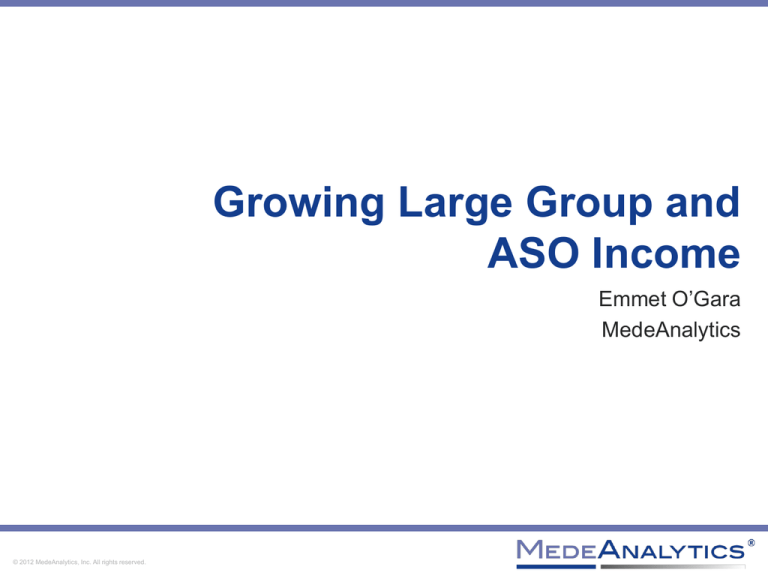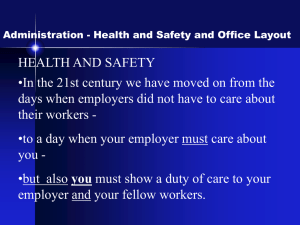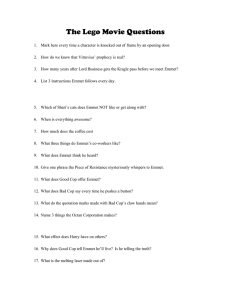
Growing Large Group and
ASO Income
Emmet O’Gara
MedeAnalytics
© 2012 MedeAnalytics, Inc. All rights reserved.
Online Resource Center
www.medeanalytics.com/er
© 2012 MedeAnalytics, Inc. All rights reserved.
2
Today’s Presenter
Emmet O’Gara, AVP of Payer Solutions
Emmet O’Gara has over 16 years of experience in the payer industry, primarily
focusing on finance, operations and analytics. As associate vice president of
Payer Solutions at MedeAnalytics, Emmet and his team help payers address
critical business issues through the use of analytics. Before he joined
MedeAnalytics in 2009, Emmet held leadership positions at Blue Cross Blue
Shield of Massachusetts, Cigna Healthcare, Accenture and Cap Gemini Ernst &
Young.
© 2012 MedeAnalytics, Inc. All rights reserved.
3
What this Webinar Covers
Using Employer Reporting to:
Provide new offerings to the market to drive premium
revenue and higher margins
Establish a competitive advantage in the marketplace
Substantially reduce the volume of ad hoc data requests
and associated administrative expense
Maintain and grow membership
© 2012 MedeAnalytics, Inc. All rights reserved.
4
Driving Premium Revenue and
Higher Margins
© 2012 MedeAnalytics, Inc. All rights reserved.
5
Challenges to Sustainability
MLR floors
Zealous regulation of rate increases
− The Maine Supreme Judicial Court unanimously found that the
State did not need to consider profitability when setting rates.
− New York announced new audits that will question the underlying
data and actuarial assumptions used to justify rate hikes.
− The Massachusetts DOI limited rate increases in the individual
and small group markets to 2.3%, the lowest increase in a
decade.
© 2012 MedeAnalytics, Inc. All rights reserved.
6
New Offerings
Provide new offerings to the market, which drive premium revenue
and subsequent high-margin dollars. Our experience is that our
clients are reselling this capability for an additional $0.20 to $0.35
PMPM and garnering significant revenue.
For example:
−
−
−
−
Participating membership – 1 million
High end increment of premium @ $0.35 PMPM - $4.2 million
Average increment of premium @ $0.28 PMPM - $3.4 million
Low end increment of premium @ $0.20 PMPM - $2.8 million
By offering this capability to employers and assuming ~50% buy in, a
health plan might garner between $2.1 and $1.4 million in new
revenue.
© 2012 MedeAnalytics, Inc. All rights reserved.
7
Establishing Competitive Advantage
© 2012 MedeAnalytics, Inc. All rights reserved.
8
Competitive Advantage
Critical clients demand comprehensive reporting
Often those customers cannot understand the value the
health plan brings with their current reporting due to:
−
−
−
−
Complex contracting arrangements with providers
Carved out services (pharmacy, DM, etc.)
DM programs that may be outsourced
Wellness programs requiring long investment
There may be a perception that your brokers, consultants
and competitors provide the “complete” picture.
© 2012 MedeAnalytics, Inc. All rights reserved.
9
Demonstrate that the Plan:
1. Pays for services that work and doesn’t pay for
inefficient, duplicative or no-impact services
2. Has reduced financial barriers to essential care
3. Has improved adherence to recommended treatments
4. Has improved employee health and productivity
5. Has reduced direct and indirect medical costs
Above all, demonstrate value.
© 2012 MedeAnalytics, Inc. All rights reserved.
10
Content Matters
We believe there are four major questions that employer
reporting needs to address:
1.
Who are we? – focused on the demographics of the employer
group
2.
How much are we spending? – looking at claim and administrative
costs to the employer as well as how that compares to other
employers
3.
Where are the dollars going? – focusing on the utilization of
services
4.
What can we change or impact? – focused on opportunities such
as medical management, prevention and wellness and benefit
design changes
© 2012 MedeAnalytics, Inc. All rights reserved.
11
Content
Demographics
̶
̶
Male/Female Counts
Age Bands
̶
̶
Total Subscribers/Total Members
Turnover/Tenure
Medical Utilization
̶
̶
̶
̶
̶
̶
Expenses Summary – Facility; Conditions; Network
Pharmacy Rx Compliance and Utilization; Brand/Generic; Mail/Retail/Specialty
By Regional location; Employer LOBs and Departments
In/Out Network
Admissions/Visits by Facility
IP/OP/Prof Cost Drivers
Medical Management
̶
̶
̶
̶
High-Cost Claimants
Case Management
Disease Management
Patient Summarizations
© 2012 MedeAnalytics, Inc. All rights reserved.
̶
̶
̶
Group Conditions Expense Details by
Service
Worksite Wellness
Preventive Care
12
Engagement Matters
1. All credible accounts
− Provide quarterly, semiannual or annual printed reporting
2. 500 or more subscribers
− Provide monthly printed reporting
− Provide account-specific, self-service analytics
3. 1,000 or more subscribers
− Provide monthly printed reporting
− Provide account-specific, self-service analytics
− Provide consultative support prior to the renewal
© 2012 MedeAnalytics, Inc. All rights reserved.
13
Reducing Ad Hoc Requests
© 2012 MedeAnalytics, Inc. All rights reserved.
14
Why?
Data complexity increases daily
Employers demand more
information more often
Managing a self-insured
population requires data
Continuing to respond to ad hoc
request growth by adding
headcount is unsustainable
© 2012 MedeAnalytics, Inc. All rights reserved.
15
Key Requirements to Reduce Ad Hoc Requests
Fast turnaround of the data
− 30 days of lag is no longer acceptable
− 24 to 48 hours should be the target
Frequent updates
− Monthly was the old standard
− Weekly updates enable financial reporting
− Daily opens up a whole new world
Ease-of-use and high performance
− Self-service analytics can have a very steep learning curve
− Slow performance impedes use
Automation
− Many “ad hoc” reports are ordered every month
− Analysts should not spend half their time formatting reports
© 2012 MedeAnalytics, Inc. All rights reserved.
16
Associated Cost Reduction
Spending resources on collecting data, assembling data, building
reports, formatting those reports, then printing/binding/shipping reports
is low value. Our experience with other clients has them realizing
reallocation of an estimated 25-40% of the FTEs dedicated to creating
and maintaining reports for employers, brokers and consultants.
FTE allocation for Employer Reporting
Loaded salary, assuming $85,000 average
20
$1.7 million
Reallocation of 25% to 40%
− High end reduction of 40% (i.e. 8 roles) − Average reduction of 32% (i.e. 6 roles) − Low end reduction of 25% (i.e. 5 roles) -
$680,000
$544,000
$425,000
By deploying this capability, a plan can reallocate resources or dedicate
the resources it already has to tasks more in line with their abilities—
such as analysis—rather than running and formatting reports.
© 2012 MedeAnalytics, Inc. All rights reserved.
17
Maintaining and Growing Membership
© 2012 MedeAnalytics, Inc. All rights reserved.
18
A Zero-Sum Game
In 2008, 65% of US workers were employed by large
employers.1
99% of large employers offered health insurance in 2011.2
Employees of large employers were far more likely to
accept coverage than employees
of smaller employers.3
Membership growth is a
zero-sum game.
1.
2.
3.
Census Bureau. Statistics about business size (including small business) from the U.S. Census Bureau [Internet]. Washington (DC): Census
Bureau; 2008 [last revised 2011 Oct17; cited 2012 Jan 18]. Available from: http://www.census.gov/econ/smallbus.html
Kaiser Family Foundation, Health Research and Educational Trust. Employer health benefits: 2011 annual survey. Menlo Park (CA): KFF; 2011 Sep.
Ibid.
© 2012 MedeAnalytics, Inc. All rights reserved.
19
SHOP Exchanges
The Congressional Budget Office (CBO) estimates that 5
million individuals will be covered by SHOP exchanges by
2019, while RAND Corporation estimates 35 million.
The Affordable Care Act (ACA) opens SHOP exchanges
to large groups in 2017—employers with more than 200
employees—but adoption is expected to be low.
Regardless, the ACA makes self-insured plans more
attractive to companies which can afford stop-loss or
which are large enough to not need it.
1.
2.
Congressional Budget Office. Letter to the Hon. Nancy Pelosi [Internet]. Washington (DC): CBO; 2010 Mar 20 [cited 2012 Mar 20]. p. 9.
Eibner C, Girosi F, Price CC, Cordova A, Hussey PS, Beckman A, et al. Establishing state health insurance exchanges: implications for health insurance
enrollment, spending, and small businesses [Internet]. Santa Monica (CA): RAND Corporation; 2010 [cited 2012 Jan 18]. (Technical Report).
© 2012 MedeAnalytics, Inc. All rights reserved.
20
Maintaining and Growing Membership
The cost of acquiring new members is 15 times that of
maintaining membership.
On a 1,000,000 member business line, 3% to 5% attrition
translates into an estimated $146 million to $284 million
in lost revenue annually.
A little math shows that maintaining membership, even
marginally, has significant value:
© 2012 MedeAnalytics, Inc. All rights reserved.
Marginal Retention
Revenue
0.25%
$13,000,000
0.5%
$26,000,000
1%
$52,000,000
21
Employer Reporting
Employer Reporting provides health plans, brokers and employers with
an interactive platform to share performance metrics and make rational,
data-driven decisions about benefit design, communication needs and
wellness initiatives.
Features and Benefits
Provides guided self-service analytics about
financial cost and use, and clinical experience
Gives an integrated view of plan performance
Collaborative environment enables
consultative sales relationship
Informs data-driven benefit designs
Enables a “culture of health”
Results in increased retention
© 2012 MedeAnalytics, Inc. All rights reserved.
22
Questions
Emmet O’Gara
emmet.ogara@medeanalytics.com
(603) 799-5483
© 2012 MedeAnalytics, Inc. All rights reserved.
23
For More Information
www.medeanalytics.com/er
© 2012 MedeAnalytics, Inc. All rights reserved.
24









